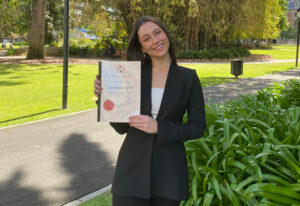Messages Girls Need To Hear About Maths – Jennifer Oaten

The Big Bang Theory is a very funny TV show. It stars four super smart, geeky physicists who love to solve maths and physics problems. Leonard, Sheldon, Howard and Rajesh are all male geniuses who thrive on complex formulae and numbers. In contrast, Penny, the lead female role, is a character who is ‘ditzy’ and lacks any higher-order mathematics skills.
How does this portray the capabilities of females in the world of mathematics?
It certainly does not role-model young women as intelligent, talented mathematicians. This is just one societal example that can influence young women to choose mathematics subjects at high school and university because it is what they see and hear in the world around them.
Why girls should study maths
Fostering a love for numbers among girls has significant educational and societal benefits. By encouraging girls to embrace numeracy, we empower them to excel in fields such as mathematics, engineering, and data science. Numeracy skills are crucial in today’s world to comprehend, interpret and analyse data, the key to many careers and roles, but also in making decisions, problem-solving and managing finances in our personal lives.
What girls need to know!

1. Girls are just as good at maths as boys!
Research over the past ten years suggests that there are no gender differences in children’s cognitive abilities and, therefore, no difference, on average, in the potential for females and males to achieve in mathematics (Spelke, 2005). It is thought that gender differences in math performance have more to do with culture than aptitude.
According to the latest results from the OECD’s Program for International Student Assessment (PISA), girls in Australia perform on a similar level to boys in maths. So we need to question if performance is similar, why do females make up only 18% of engineering majors at university? Girls chose courses based on success.
We need girls to know they can succeed at maths.
2. You can do maths and do it well!
Girls also report higher levels of anxiety about maths and significantly lower levels of confidence than boys (Thomson, DeBortoli, & Buckley, 2013). Math discomfort felt by other females can unintentionally pass on the notion that maths is for boys and that it is challenging for females or, as commonly said, ‘I hated maths’ or ‘I wasn’t great at maths’ can be damaging.
We need to create an equal playing field that empowers girls to pursue their passion for mathematics. Self-confidence plays a vital role in girls’ relationship with numbers. When they possess confidence, they actively engage with and excel in math. Addressing this issue and providing support to boost their self-assurance is crucial. We need to encourage them to replace negative thoughts with affirmations, remind them of their problem-solving prowess and implement strategies to empower girls to embrace math with confidence and excel in their numerical skills.
Cultivating a supportive environment to nurture a growth mindset that embraces mistakes and values effort will create a safe space for learning and personal growth. Praising efforts to move past frustration, having a go and making mistakes rather than praise for the correct answer will help girls show resilience and tackle any maths challenge. Celebrating achievements by recognising and celebrating their progress, no matter how small, will boost confidence and motivation to keep learning and improving.
We need to ensure girls believe success in mathematics is achievable.
3. Maths has real-life relevance.
Australian girls are less likely than boys to be interested in maths, according to PISA. This lack of interest is a key factor in why they are less engaged and don’t choose maths subjects.
Girls’ scores in maths and science are generally somewhat similar; however, girl’s scores in humanities subjects are around 13% higher. Girls have strengths in the humanities and, as a result, may favour choosing these subjects over maths subjects.
Efforts to increase students’ interest, enjoyment or intrinsic value can improve students’ perceptions of mathematics and promote the importance of mathematics. Providing diverse learning opportunities enables girls to connect math to real-life scenarios to demonstrate its relevance and problem-solving nature. This will help girls see the practical applications of math beyond the classroom and know that math will be important for future studies or careers.
Collaboration can enhance learning and problem-solving in math. Group tasks and discussions not only encourage teamwork but also allow girls to learn from one another’s perspectives and approaches. Introducing math concepts in creative and engaging ways.
Highlighting how maths is used in technology, engineering, finance, medicine, and many other fields helps girls to see future pathways for themselves. By connecting math to real-world scenarios, girls can see how their skills can make a tangible impact on the world around them rather than just seeing math as numbers.
We need to ensure girls understand the exciting and dynamic aspects of mathematics.
What can parents do?

Parents have a significant role to play in fostering a love for numbers in their daughters. Your home can serve as the first classroom where girls are exposed to the world of mathematics. From introducing numbers and basic arithmetic in the early years to supporting complex calculations and problem-solving as they grow older, parents can be the primary influencers in shaping their daughters’ perception and aptitude for maths. Here are some practical strategies parents can employ to foster girls’ love for numbers:
- Females, both mothers and educators, must not endorse negative gender stereotypes. Do not deride or downplay your math skills.
- Parents can instil positive math values in their daughters early on, enabling them to reject the math anxiety and stereotypes they may see or hear.
- Create and promote confidence in their daughter in her ability to excel at math and share stories of colleagues, family or role models and their contributions in the areas of maths.
- Mothers and Fathers can promote a love of numbers in everyday life from a young age, whether associated with cooking, shopping, travel, restaurants, budgeting or bills. Don’t let this always be Dad’s role.
- Explore maths in nature by identifying geometric shapes in buildings and the environment or measuring distances and angles during outdoor activities.
- Celebrate achievements and provide positive reinforcement to boost confidence and motivation in numerical learning.
- By collaborating and encouraging girls’ interest in numbers, educators and parents can play a vital role in dismantling gender stereotypes.
By incorporating these strategies into daily routines, parents can make maths a more engaging and desirable subject, fostering a love of numbers in girls. These efforts will cultivate a positive and confident attitude towards numbers, empowering girls to excel academically and pursue diverse STEM career opportunities.
Fortunately, in later seasons of The Big Bang Theory, Amy and Bernadette made their entrance as highly intelligent female characters. Amy, a renowned neuroscientist, and Bernadette, a talented microbiologist, serve as capable and successful role models for aspiring girls.
Together, we can cultivate a new generation of female mathematicians, engineers, and scientists empowered to pursue their passion for numbers and make a difference in the world.

Caitlyn Goldney (2013) Embarks On A Legal Career
Caitlyn Goldney (2013) is a passionate advocate dedicated to giving back to the community through her legal savoir faire.

Combating The Attention Span Crisis In Our Students – Jennifer Oaten
It is no secret that attention spans have been steadily declining, especially among younger generations growing up immersed in digital technology. The average person’s attention span when using a digital device has plummeted from around two and a half minutes back in 2004 to just 47 seconds on average today – a dramatic 66% decrease over the past two decades.

Weekly Wrap Up: Term 2, Week 2, 2024
Week 2 has come to an end! This Weekly Wrap Up features highlights from Scuba Diving Club, the Sisterhood Series, and Boarding ANZAC Service.
- Featured
Author: Santa Maria College
Santa Maria College is a vibrant girls school with a growing local presence and reputation. Our Mission is to educate young Mercy women who act with courage and compassion to enrich our world. Santa Maria College is located in Attadale in Western Australia, 16 km from the Perth CBD. We offer a Catholic education for girls in Years 5 – 12 and have 1300 students, including 152 boarders.






